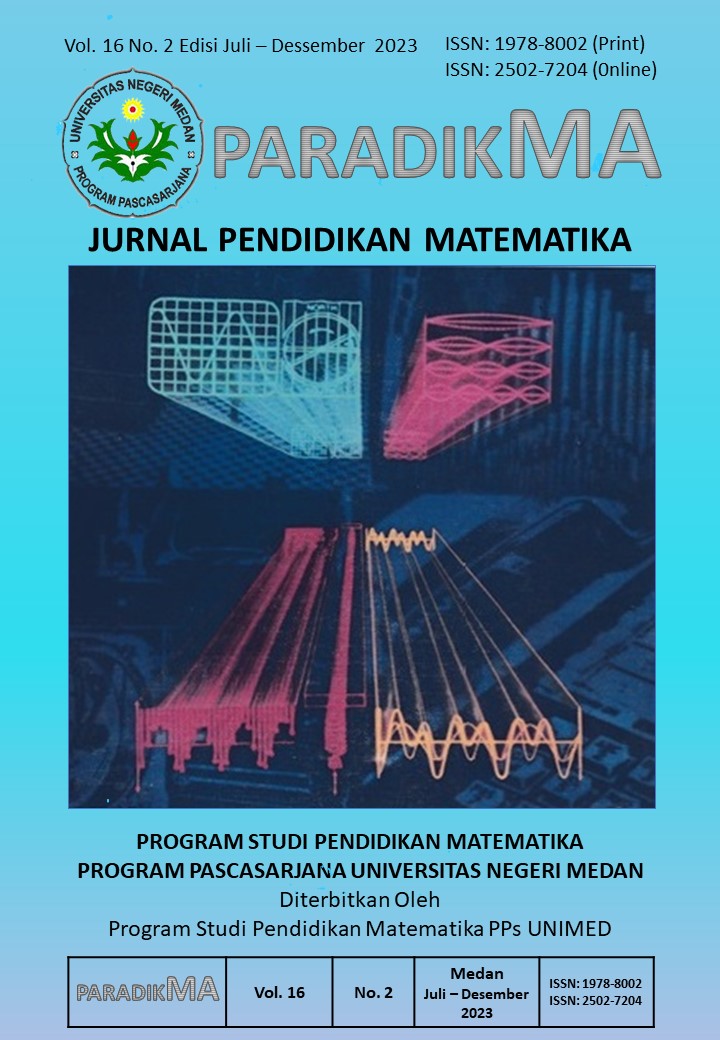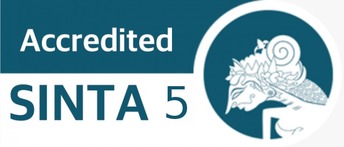The Influence of Early Mathematical Ability and Learning Cycle 5e Model Assisted by Geogebra to Improve Students' Mathematical Problem Solving Ability and Students' Mathematical Learning Independence
DOI:
https://doi.org/10.24114/paradikma.v16i2.48742Abstract
This study examined how early math skills affect mathematical problem-solving and independent learning. This study also examines how the Geogebra-assisted Learning Cycle 5E model affects students' mathematical problem-solving and learning independence. Finally, this study investigates if the Geogebra-assisted Learning Cycle model interacts with students' initial mathematical abilities. This study sought: A comprehensive study is needed to determine how early mathematical aptitude affects arithmetic problem-solving and academic performance. Class VIII SMP Plus Jabal Rahmah Mulia Medan did this research. The experimental class had 19 students and the control class 20. Cluster random sampling is utilized in quasi-experimental designs like this investigation. The Early Mathematics Ability Test (MIA), problem-solving exams, and math independence questionnaires were used to collect research data. A two-way Anova test will examine the data. The study found that various factors affect pupils' arithmetic problem-solving ability and math independence. First, the student's math skill matters. Second, the Geogebra-assisted Learning Cycle 5E paradigm affects math problem-solving and independence. Finally, kids' early math skills (high, medium, or low) did not affect mathematical problem solving or independent learning.Keywords: Initial Mathematical Ability, Learning Cycle 5E, Mathematical Problem Solving Ability, Mathematical Learning IndependenceReferences
Ansori, Y. (2019). Pengaruh Kemandirian Belajar terhadap Kemampuan Pemecahan Masalah Matematis Siswa SMP. Journal of Medives: Journal of Mathematics Education IKIP Veteran Semarang., 3(1).(ISSN : 2549-8231.), pp.11-19.
Aqib, Z. (2016). Model-model, Media, dan Strategi Pembelajaran Konstektual (Inovatif). Yrama Widya.
Hudojo, H. (2018). Mengajar Belajar Matematika. Depdikbud.
Masri, MF., dkk. (2018). Pengaruh Metode Pembelajaran Berbasis Masalah terhadap Self-Efficacy dan Kemampuan Pemecahan Masalah Matematis ditinjau dari Kemampuan Awal Matematika Siswa SMA. JPPM., 11 (1), 116“126.
Polya, G. (1973). How To Solve It. A New Aspect of Mathematical Method. Stanford University.
Sormin, M. . (2016). Upaya Meningkatkan Kreativitas Belajar Matematika Siswa melalui Pembelajaran Cooperative Learning Tipe Jigsaw di SMK Negeri 1 Padangsidimpuan. Jurnal Eksakta, 2(1)., 19-27.
Sukoco, H. (2016). Pengaruh Pendekatan Brain Based Learning terhadap Kemampuan Komunikasi Matematis dan Self-Efficacy Siswa SMA. Jurnal Pendidikan Matematika, 11(1)., 11-224.
Surya, E., dkk. (2013). Improving of Junior High School Visual Thinking Representation Ability in Mathematical Problem Solving by CTL. IndoMS. J.M.E, 4(1)., 113-126.
Suryani, M., dkk. (2020). Analisis Kemampuan Pemecahan Masalah Siswa Berdasarkan Kemampuan Awal Matematika. Mosharafa: Jurnal Pendidikan Matematika, 9(1)., 119-130.
Sutianah, C. (2021). Belajar dan Pembelajaran. Jawa Timur. CV. Penerbit Qiara Media.
Trianto. (2011). Model-model Pembelajaran Inovatif Berorientasi Konstruktivistik. Prestasi Pustaka Publisher.
Zulfah, Z. (2017). Pengaruh Penerapan Model Pembelajaran Kooperatif Tipe Think Pair Share dengan Pendekatan Heuristik terhadap Kemampuan Pemecahan Masalah Matematis Siswa MTs Negeri Naumbai Kecamatan Kampar. Jurnal Cendekia: Jurnal Pendidikan Matematika, 1(2)., 1-12.







